Response To Resignation Letter
[Your Name]
[Your Title/Position]
[Company/Organization Name]
[Company Address]
[City, State, ZIP Code]
[Date]
[Employee's Name]
[Employee's Address]
[City, State, ZIP Code]
Dear [Employee's Name],
I received your resignation letter dated [date], and I want to acknowledge that I have accepted your decision to step down from your position as [Employee's Position] at [Company/Organization Name]. While I am saddened to see you go, I understand and respect your choice.
Your contributions during your time with us have been truly valuable, and your dedication and hard work have significantly impacted our team and organization positively. Your commitment to excellence and your willingness to go the extra mile have left a lasting impression on all of us.
We appreciate the professionalism with which you have approached your responsibilities and the positive attitude you brought to the workplace. Your ability to collaborate with colleagues and take on challenges head-on has been an inspiration to your peers.
As you embark on the next phase of your career, I have no doubt that you will continue to excel and achieve great success. Should you need any assistance or a letter of recommendation for your future endeavors, please do not hesitate to reach out to me. We will be more than happy to provide any support you may need during this transition period.
The door will always be open for you to return to [Company/Organization Name] if circumstances change or if you ever wish to rejoin our team. You will be greatly missed, and your absence will create a void that won't be easy to fill.
We will organize a farewell gathering to celebrate your contributions and to bid you a proper goodbye. It will be an opportunity for all of us to express our gratitude for your exceptional work and to wish you well in your future pursuits.
Once again, thank you for your dedication and commitment to [Company/Organization Name]. It has been a pleasure working with you, and we wish you nothing but the best in all your future endeavors.
Please do not hesitate to contact me if you have any questions or require any assistance during this transition period.
Sincerely,
[Your Name]
[Your Title/Position]
[Company/Organization Name]
[Contact Information]
Professional Acceptance of Resignation
Subject: Acceptance of Your Resignation
Dear [Employee Name],
I acknowledge receipt of your resignation letter dated [Date], with your last working day being [Date]. After careful consideration, I accept your resignation from your position as [Job Title].
We appreciate the [Duration] years of dedicated service you have provided to [Company Name]. Your contributions to [Specific Projects/Achievements] have been valuable to our organization's success.
During your remaining time with us, please work with [HR Manager/Supervisor] to ensure a smooth transition of your responsibilities. We will arrange for knowledge transfer sessions and documentation of ongoing projects.
Your final paycheck, including accrued vacation time and benefits information, will be processed according to company policy. Please coordinate with HR regarding the return of company property and completion of exit procedures.
We wish you success in your future endeavors and thank you for your professionalism during this transition period.
Best regards,
[Your Name]
[Your Title]
Heartfelt Response to Valued Employee
Subject: Your Resignation - Mixed Feelings
Dear [Employee Name],
Your resignation letter came as quite a surprise, and I must admit, it's difficult to imagine our team without you. While I respect your decision and understand that career growth sometimes requires new paths, I can't help but feel a sense of loss.
Over the past [Duration], you've become more than just a colleague – you've been a cornerstone of our department. Your creativity, dedication, and positive spirit have touched everyone around you. The way you handled [Specific Situation] and your innovative approach to [Project] are just a few examples of why you'll be deeply missed.
I want you to know that while we're sad to see you go, we're also incredibly proud of the opportunities that await you. Your decision shows courage and ambition, qualities that have always defined you.
Please don't be a stranger. Our doors are always open, and I hope you'll keep in touch. I'd love to hear about your new adventures and successes.
With warm regards and best wishes,
[Your Name]
[Your Title]
Counter-Offer Resignation Response
Subject: Re: Your Resignation - Let's Discuss
Dear [Employee Name],
I received your resignation letter, and I must say it caught me off guard. Before we process your resignation, I'd like to schedule a meeting to discuss your decision and explore whether there's anything we can do to address your concerns.
Your value to this organization cannot be overstated. You've consistently exceeded expectations, and losing someone of your caliber would be a significant loss. I'm wondering if there are specific issues or opportunities that might have influenced your decision to leave.
Would you be open to discussing:
- Salary adjustment and benefits enhancement
- Flexible work arrangements or remote work options
- New responsibilities or a different role that aligns with your interests
- Professional development opportunities
- Changes to your current work environment
I believe we can find a mutually beneficial solution that addresses your needs while keeping your expertise within our team. Please let me know when you'd be available for a confidential discussion.
Looking forward to our conversation.
Sincerely,
[Your Name]
[Your Title]
Formal Acknowledgment with Concerns
Subject: Acknowledgment of Resignation Notice
Dear [Employee Name],
This letter acknowledges receipt of your resignation submission dated [Date], indicating [Date] as your final work day.
I must note that your proposed notice period of [Duration] falls short of the [Required Period] specified in your employment contract. According to Section [X] of your agreement, adequate notice is essential for proper transition planning.
Additionally, you currently have outstanding responsibilities including [Specific Projects/Tasks] that require completion or proper handover. We need to discuss how these commitments will be addressed before your departure.
Please schedule a meeting with HR and myself by [Date] to review your contractual obligations and develop a comprehensive transition plan. This includes:
- Project documentation and handover procedures
- Client relationship transfers
- Equipment and access credential returns
- Exit interview completion
Your cooperation in ensuring a professional transition is expected and appreciated.
Regards,
[Your Name]
[Your Title]
Immediate Acceptance - Security Sensitive Role
Subject: Immediate Acceptance of Resignation
Dear [Employee Name],
Your resignation dated [Date] is hereby accepted, effective immediately.
Due to the sensitive nature of your role and access to confidential information, your employment will terminate today rather than your proposed end date of [Date]. This decision is standard protocol for positions with high-level security clearance.
You will receive full compensation for your intended notice period as outlined in your severance package. HR will contact you today regarding:
- Final paycheck processing
- Benefits continuation options
- Return of all company property
- Non-disclosure agreement reminders
Please gather your personal belongings and coordinate with security for building access termination. A representative will escort you during this process, which is standard procedure and not a reflection of your performance.
Thank you for your service to the organization.
[Your Name]
[Your Title]
Casual Response to Long-Term Employee
Subject: So you're really doing it!
Hi [Employee Name],
Well, the day has finally come! I have to admit, part of me always knew you'd eventually spread your wings and take on new challenges. While I'm excited for your next adventure, I'm definitely going to miss having you around.
You've been such an integral part of our team family. Remember when we stayed late working on that impossible deadline for [Project]? Or when you single-handedly saved the [Event] from disaster? Those are the moments that make this job worthwhile, and you've given us so many of them.
Don't worry about the transition stuff – we'll figure it out as we always do. Right now, I just want you to know how grateful I am for everything you've brought to this team. Your humor, your work ethic, and your ability to keep us all sane during crazy times won't be easily replaced.
Let's definitely grab lunch before you go. I want to hear all about this new opportunity and make sure we stay in touch.
Cheers to your next chapter!
[Your Name]
Response to Problematic Employee Resignation
Subject: Acknowledgment of Resignation
Dear [Employee Name],
I acknowledge receipt of your resignation letter dated [Date]. Your resignation is accepted, and your employment will conclude on [Date] as indicated.
During your remaining time, please focus on completing current assignments and ensuring proper documentation of your work. All company property must be returned, and outstanding matters resolved before your departure date.
HR will provide you with information regarding final compensation, benefits, and exit procedures. Please coordinate directly with them for scheduling your exit interview and returning company assets.
We wish you well in your future endeavors.
[Your Name]
[Your Title]
Response to Retirement Resignation
Subject: Congratulations on Your Retirement!
Dear [Employee Name],
What a moment this is! After [Number] incredible years with our organization, you've earned this well-deserved retirement. Your resignation letter marks the end of an era, and I want to take this opportunity to celebrate your remarkable career.
From your early days in [Department] to your leadership role in [Current Position], you've been a guiding force and mentor to countless colleagues. Your institutional knowledge, wisdom, and steady presence have shaped our organization's culture and success.
We're planning a proper send-off celebration, and I hope you'll allow us to honor your contributions appropriately. You've touched so many lives here, and we want to give everyone a chance to express their gratitude.
While we'll miss your expertise and leadership, we're thrilled that you'll finally have time to pursue [Personal Interests/Plans]. You've more than earned this new chapter of relaxation and adventure.
Please know that you'll always be part of our organizational family. We hope you'll visit often and keep us updated on your retirement adventures.
With deep appreciation and warmest wishes,
[Your Name]
[Your Title]
What is a Response to Resignation Letter and Why is it Necessary
A response to resignation letter is a formal communication acknowledging an employee's decision to leave their position. This document serves multiple critical purposes: it provides legal documentation of the resignation acceptance, establishes final work arrangements, and maintains professional relationships. The response protects both employer and employee interests by clarifying terms, expectations, and procedures during the transition period. It also demonstrates organizational professionalism and can influence the departing employee's perception of the company, potentially affecting future references, rehiring possibilities, and word-of-mouth reputation.
Who Should Write and Send the Response
The response should typically come from the employee's direct supervisor or manager, as they have the most immediate working relationship and authority over day-to-day operations. However, in larger organizations, HR departments may handle the administrative aspects while the manager provides personal acknowledgment. For senior-level resignations, responses might come from department heads or executive leadership. The key is ensuring the response comes from someone with appropriate authority to accept the resignation and make decisions about transition arrangements. In some cases, both HR and the direct manager may send separate responses addressing different aspects of the resignation.
When to Send a Resignation Response
- Within 24-48 hours of receiving the resignation letter
- Before the employee's proposed last working day
- After consulting with HR and legal teams for complex situations
- When counter-offers or retention discussions are being considered
- Following company policy regarding resignation procedures
- Before announcing the departure to other team members
- When immediate acceptance is required for security-sensitive positions
- After reviewing contractual obligations and notice periods
- When retirement or long-term employee departures require special handling
How to Write an Effective Response
Start by acknowledging receipt of the resignation letter with specific dates mentioned. Express appropriate sentiment based on your relationship with the employee and circumstances. Address practical matters including last working day, transition responsibilities, and company property return. Be clear about next steps and who will coordinate various aspects of the departure process. Maintain professionalism regardless of whether the departure is welcome or challenging. Consider the tone carefully - it should match the situation while remaining respectful. Include relevant information about benefits, final pay, and any continuing obligations. End with appropriate well-wishes or next steps as the situation warrants.
Requirements and Prerequisites Before Responding
- Review the employee's contract for notice period requirements
- Consult with HR regarding company policies and procedures
- Check for any pending disciplinary actions or performance issues
- Verify current projects and responsibilities requiring transition
- Assess security clearance and access credential implications
- Consider whether counter-offers or retention strategies are appropriate
- Gather information about final pay, accrued benefits, and company property
- Determine who will handle various aspects of the departure process
- Review legal obligations and potential non-compete agreements
- Plan communication strategy for announcing the departure to others
Formatting Guidelines and Best Practices
Keep responses professional and concise, typically one page maximum. Use business letter format with proper headers, dates, and signatures. Be specific about dates, responsibilities, and next steps to avoid confusion. Match the tone to the relationship and circumstances while maintaining professionalism. Send responses via email for immediate acknowledgment, followed by hard copy if required. Use clear subject lines that reference the resignation. Include relevant contact information for follow-up questions. Proofread carefully as this becomes part of the employee's permanent record. Consider copying HR or other relevant stakeholders as appropriate. Save copies for documentation purposes and potential future reference.
Common Mistakes to Avoid
Never respond emotionally or negatively, even if the resignation creates difficulties. Don't make promises about future opportunities without proper authority. Avoid discussing the resignation with other employees before proper announcement procedures. Don't ignore contractual obligations or company policies in your response. Never use resignation responses to air grievances or criticize the departing employee. Don't delay response unnecessarily, as this can create legal and operational complications. Avoid vague language about responsibilities or timelines that could cause confusion. Don't forget to coordinate with relevant departments like HR, IT, and security. Never make assumptions about reasons for leaving without direct communication from the employee.
Follow-up Actions After Sending Response
Schedule transition meetings to discuss knowledge transfer and project handovers. Coordinate with HR for exit interviews and final paperwork completion. Arrange for return of company property including equipment, access cards, and confidential materials. Plan announcement communications to team members and stakeholders. Begin recruitment process if position needs immediate filling. Document all interactions and agreements made during transition period. Ensure final paycheck processing includes accrued vacation and benefits. Update access permissions and security credentials. Consider stay interviews with remaining team members to address concerns. Evaluate workload distribution and temporary coverage arrangements until replacement is found.
Elements That Must Be Included in Every Response
- Formal acknowledgment of receiving the resignation letter
- Acceptance or non-acceptance of the proposed resignation terms
- Confirmation of final working date and any adjustments needed
- Overview of transition responsibilities and expectations
- Information about final pay, benefits, and company property return
- Contact information for HR or other relevant departments
- Next steps for exit procedures and documentation
- Professional closing appropriate to the relationship and circumstances
- Clear timeline for completing various departure-related tasks
- Reference to relevant company policies or contractual obligations
Comparing Response Types and Alternative Approaches
Resignation responses differ significantly from termination letters, as they acknowledge voluntary departure rather than imposed separation. Unlike promotion or transfer communications, resignation responses focus on ending rather than continuing employment relationships. Counter-offer letters attempt retention while standard responses accept departure. Retirement responses celebrate achievement while regular resignation responses maintain neutral professionalism. Immediate acceptance responses prioritize security over transition planning. The key difference lies in intent: responses acknowledge employee choice while maintaining organizational interests. Alternative approaches might include face-to-face meetings before written responses, or combined HR and management communications addressing different aspects of the departure process.

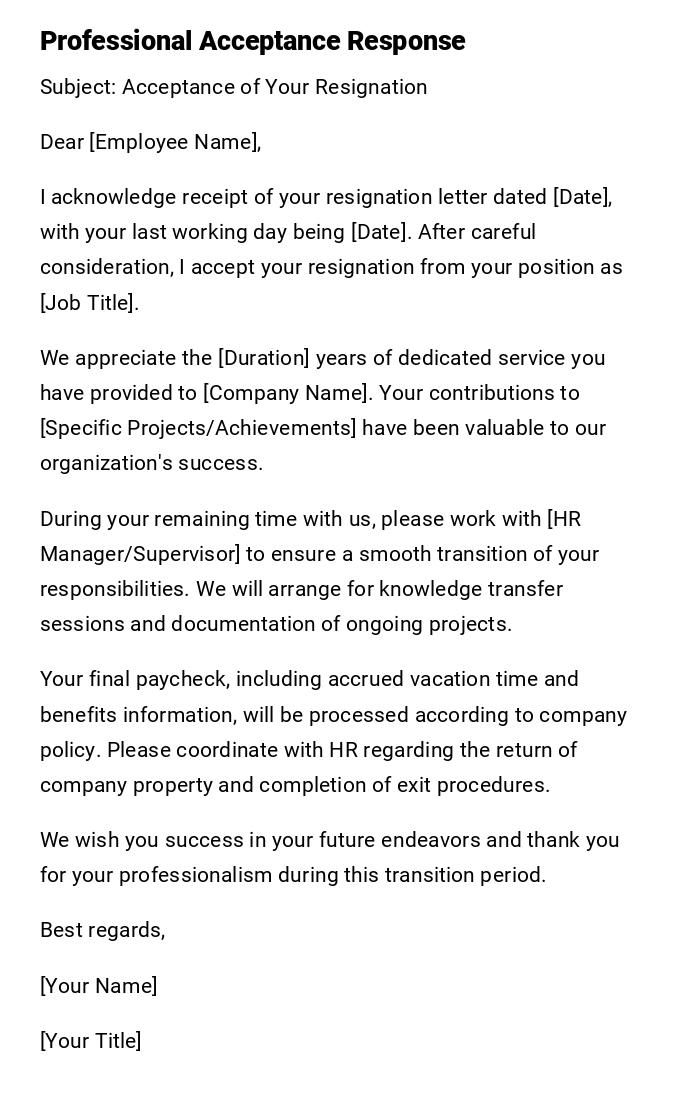
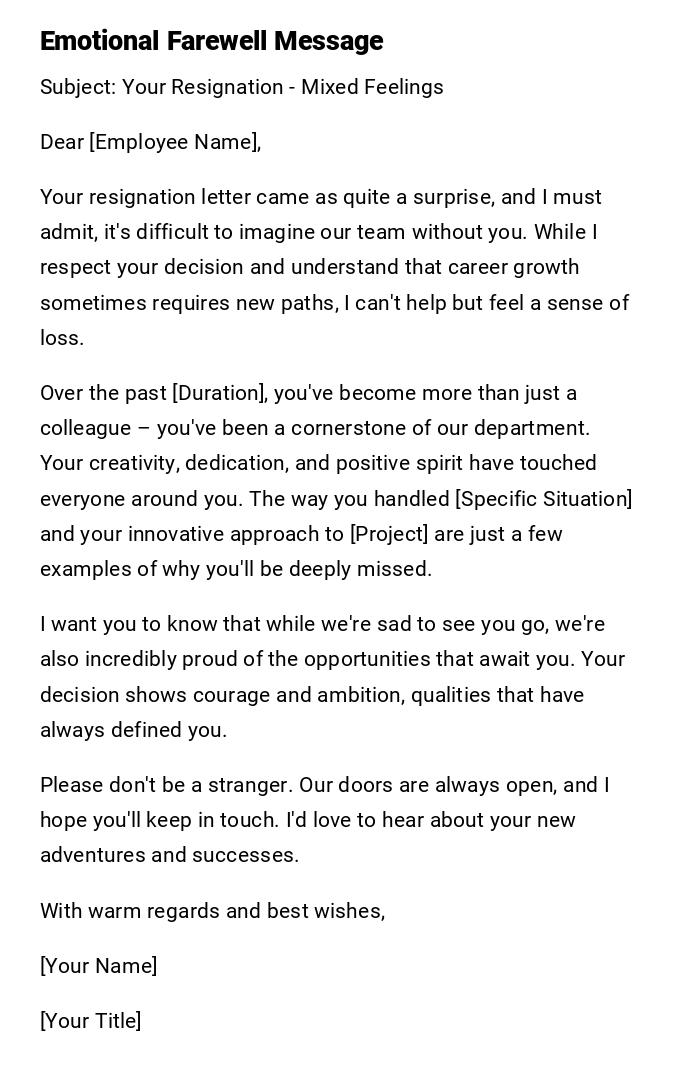
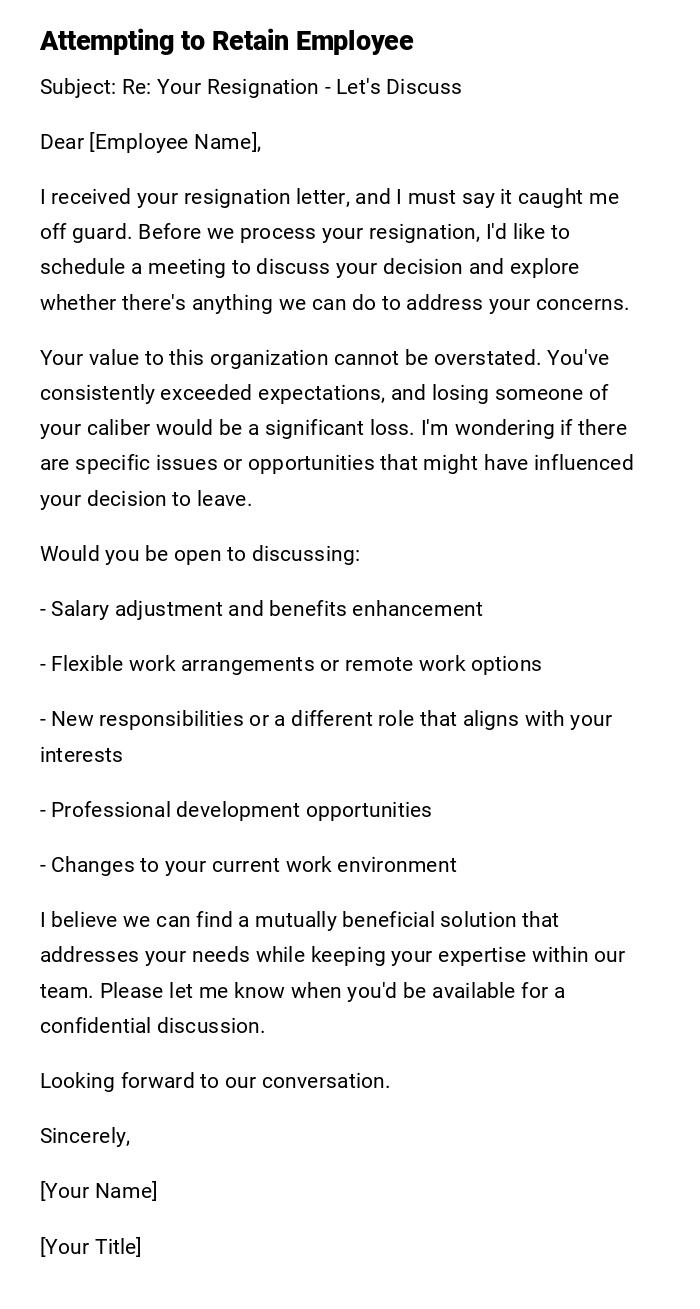
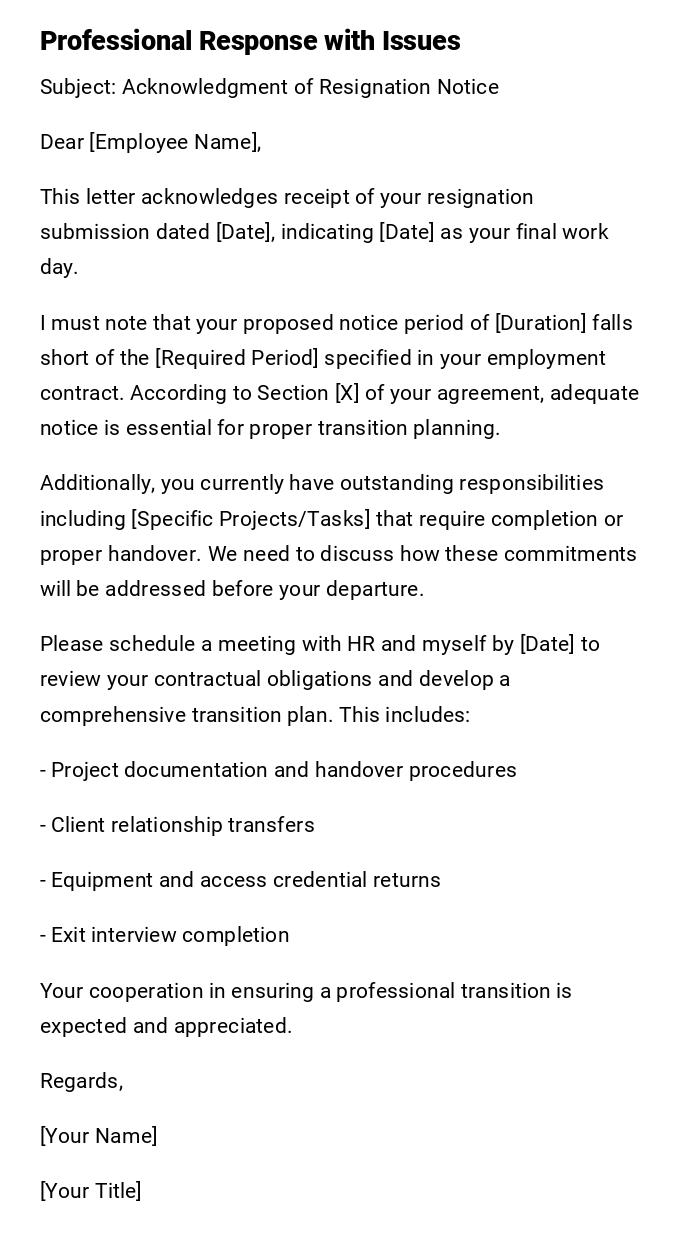
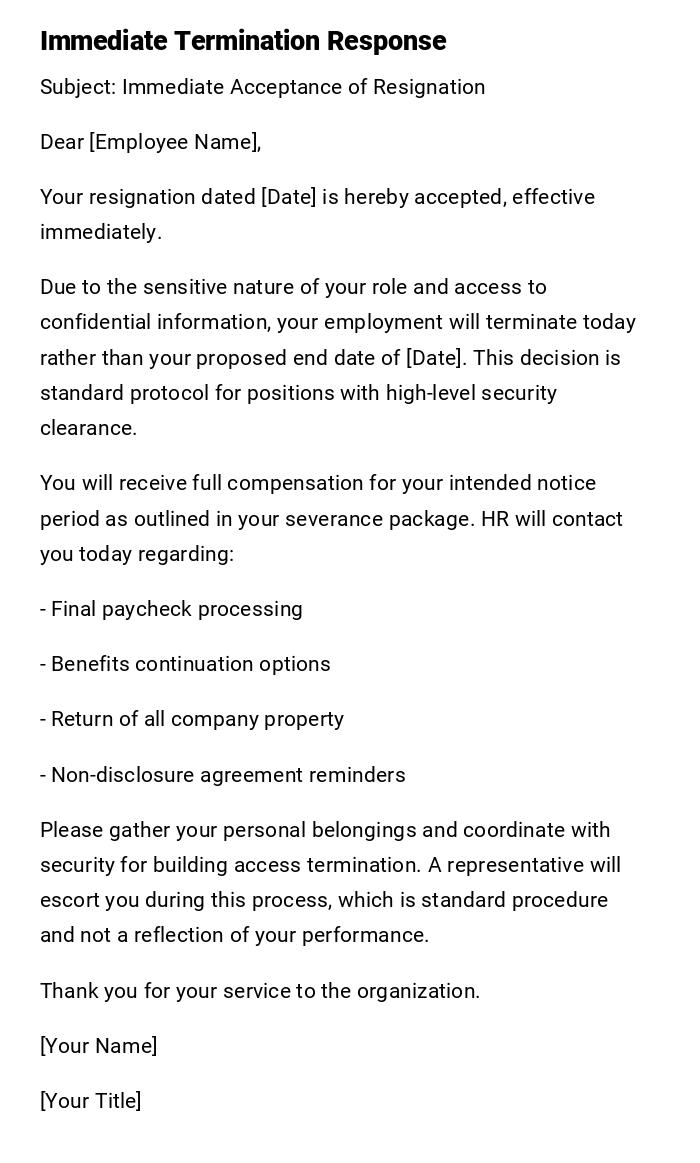
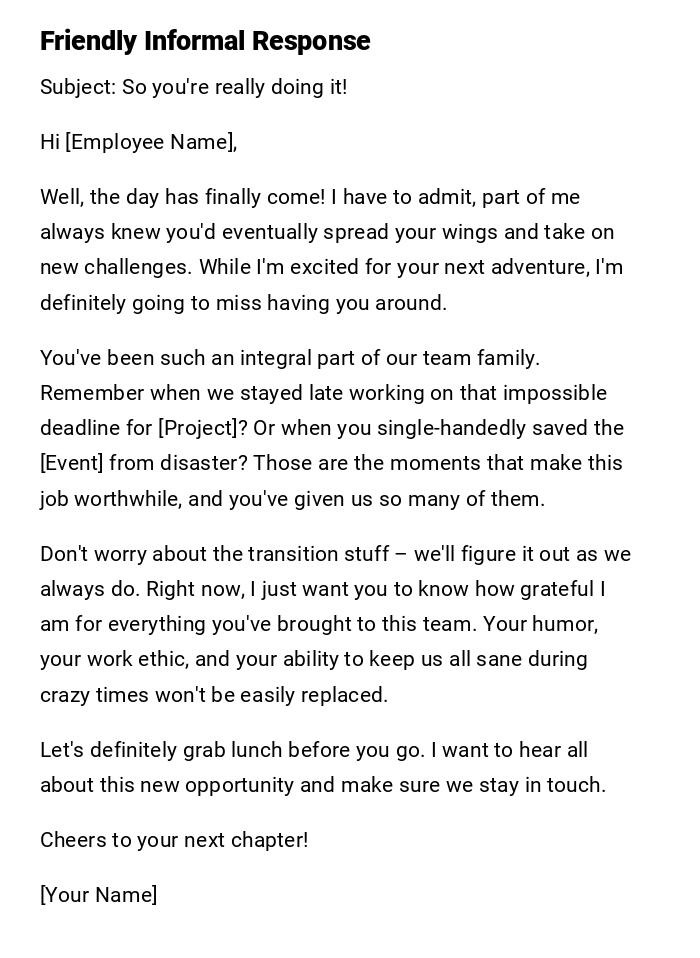
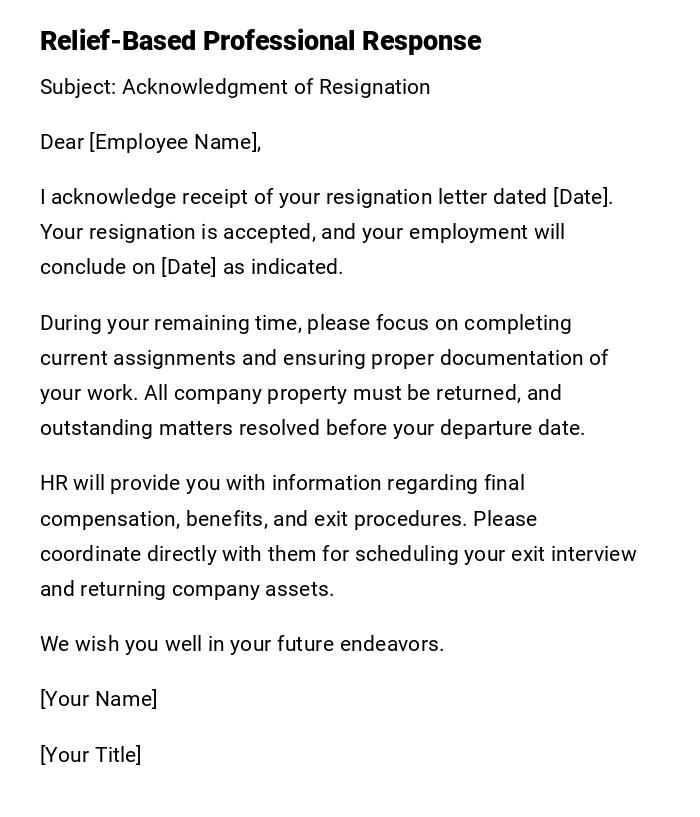
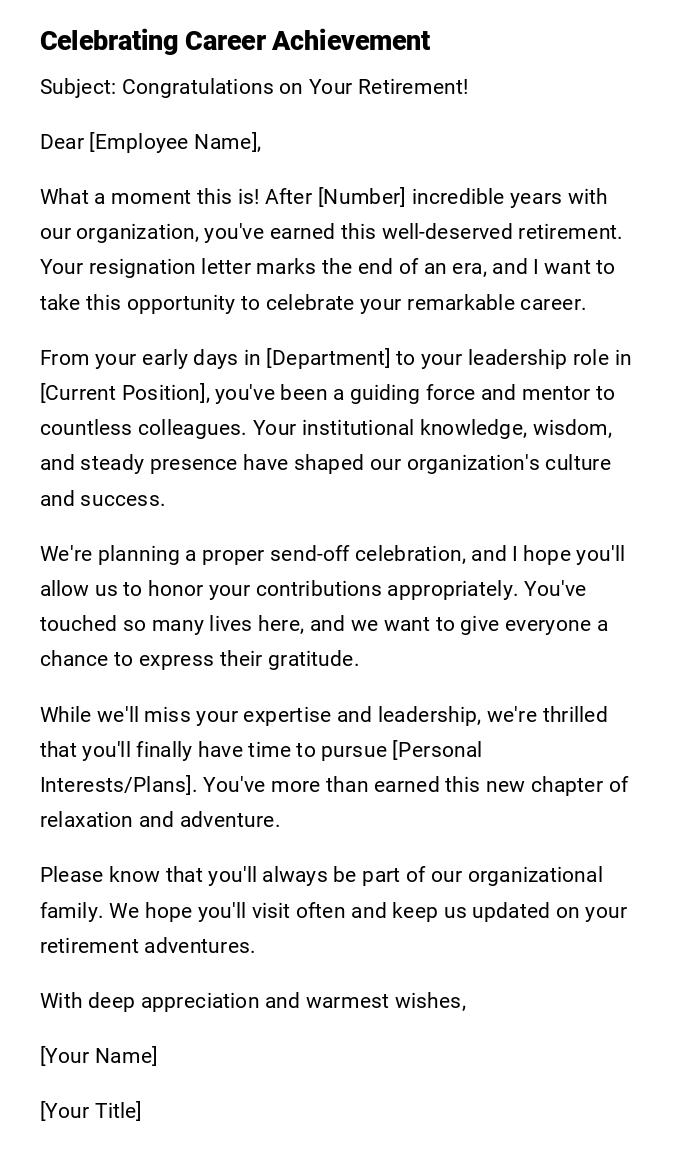

 Download Word Doc
Download Word Doc
 Download PDF
Download PDF